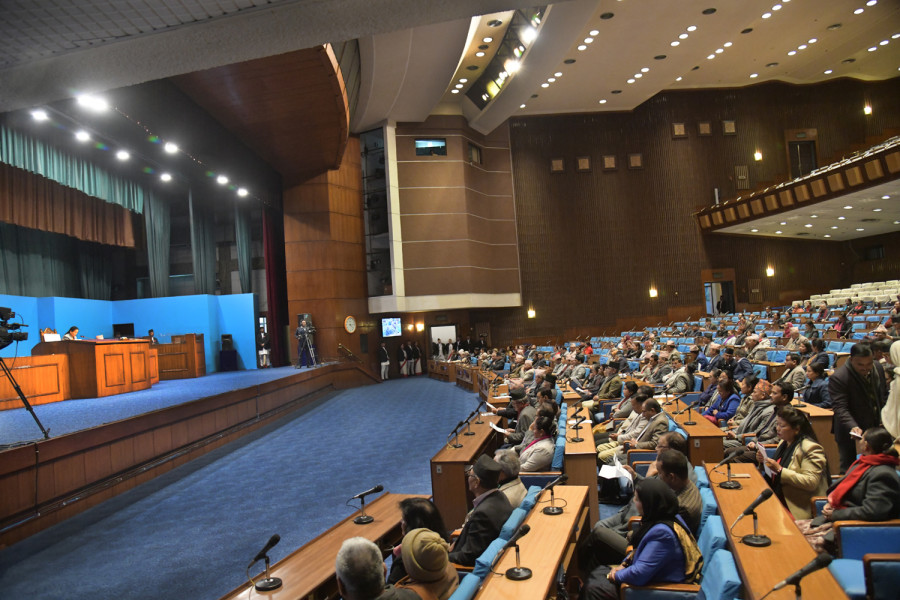Politics
Parliament functioning more like extension of government, rather than sovereign entity, experts say
They argue the legislative, responsible for discussing issues of public interest and holding the Cabinet to account, has been overshadowed by the executive.
Anil Giri
In a parliamentary democracy, the role of the two houses of Parliament is paramount. As the legislative arm of the state, the House of Representatives, or the Lower House, deliberates on bills, holds discussions on issues of public interest, and formulates policy. But Nepal’s House of Representatives has increasingly been overshadowed by the executive, functioning more like an extension of the government rather than a principal actor in the separation of powers, say parliamentary experts.
This, however, is not a new development. Historically, the Parliament has always functioned as a tool of the ruling governing party, rather than a platform to discuss policy-related issues, constitute laws, formulate policy, and direct and guide the government, say experts. But with the formation of one of the strongest governments in Nepal’s history, the parliamentary system has become more hollowed than ever, they say.
“The Parliament function as per its composition and right now, the Parliament is in the hands of those who once didn’t believe in the parliamentary system itself,” said Daman Nath Dhungana, a former House Speaker.
Dhunagana was referring to the Maoists, who in 2018 merged with the UML to form the Nepal Communist Party, which holds a near two-thirds majority in Parliament. The Maoists, in 1996, had gone to war with the state, disavowing the parliamentary system.
But according to Dhungana, the fault does not just lie with the ruling party, the primary opposition, Nepali Congress, which has been a staunch proponent of the parliamentary system since the dawn of democracy in the 1950s, has also failed on multiple counts. “The Nepali Congress failed to insert some key features of the parliamentary system into the constitution,” said Dhunagana, who believes that provisions like a vote of no confidence and a fully elected Lower House are critical to the parliamentary system. “But I see a lack of commitment from both sides, ruling and opposition, to make our parliamentary system vibrant and functional.”
Rather than handling serious public policy issues, the government more concerned with control—control over the media and freedom of expression are some examples—said Dhungana.
“The Parliament needs to concern itself with making democracy and federalism functional,” he said.
The parliamentary system is a rules-based system, where specific provisions are enacted to make sure that the House functions in an orderly manner. But Nepal’s Lower House has been functioning without a Deputy Speaker for over a month now, ever since Shiva Maya Tumbahangphe resigned on January 20.
According to one ruling party leader, the power struggle within the ruling party has taken its toll on the parliamentary function, which reflects in the failure to appoint a Deputy Speaker.
“The ruling party is divided and its ramifications are being seen in parliamentary functioning,” said the ruling party leader on condition of anonymity. “With the House divided and the opposition weak, the Parliament has not been able to function.”
In the parliamentary system, the government assigns business to the House, where lawmakers discuss individual bills, table proposals and demands answers from the government on issues of public concern to hold the government accountable. The Parliament Secretariat charts out a business plan for the House where the role of the ruling and opposition parties is very much equal and important.
“If you ask me about the function and role of the present Parliament, it is not up to the mark,” said Som Bahadur Thapa, a former secretary who served at the House for over a decade. “Failing to appoint a Deputy Speaker for such a long time shows that the Parliament is being held hostage to the ruling party’s partisan interest, something that we had also noticed in the election of the Speaker.”
The election of Agni Sapkota as Speaker of the House was also fraught with partisan infighting between two factions of the ruling party. Eventually, it was the Maoist faction that prevailed.
Neglecting House business is especially irresponsible at a critical time like now, with the ongoing Covid-19 outbreak, said Thapa.
“What will happen if the Speaker has to go into quarantine?” said Thapa “Parliament should have a plan B. At this stage, we need to seriously discuss the pandemic in the House. On important national issues like this, the House should direct the government.”
However, Sunday’s meeting of the Lower House was postponed due to concerns over the outbreak.
Even ruling party leaders admit that since it is the job of the government to give the House business, the executive is also responsible for the current state of the legislative. “If the government provides the House with agendas, then it runs; if not, then it stays passive,” said Dev Gurung, chief whip of the ruling party. “Second, ruling party lawmakers cannot go against what the government does. It is the job of the opposition to raise their voice.”
According to parliamentary experts, the relationship between the executive and the legislative is a delicate one and requires balance. Although there is a clear separation of powers, there are numerous avenues of overlap. But it is clear that the government is largely dictating what the Parliament should do, especially since the opposition is so weak.
The Nepali Congress has attempted to halt regular House proceedings and table some issues of public, but those instances have been rare and limited to some vocal lawmakers.
Congress leaders, however, largely shirk the blame and point to the ruling party instead. “Government should answer the issues raised in the House by the ruling or the opposition,” said Bal Krishna Khand, Nepali Congress chief whip in the Upper House. “But the government has not responded to any of these issues seriously. This shows that the Parliament is not functioning as intended.”




 22.12°C Kathmandu
22.12°C Kathmandu















